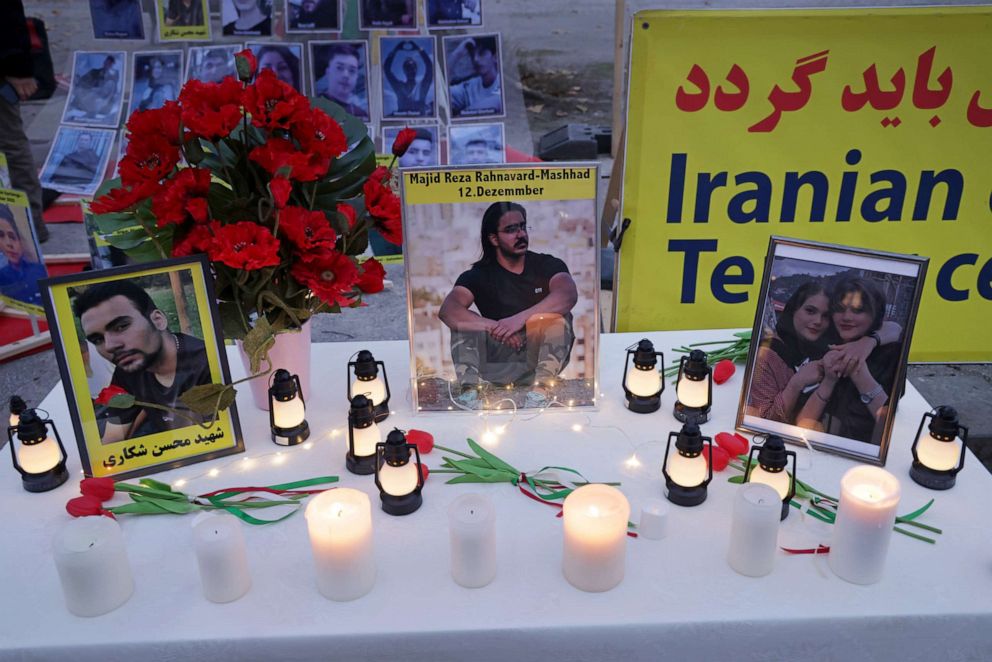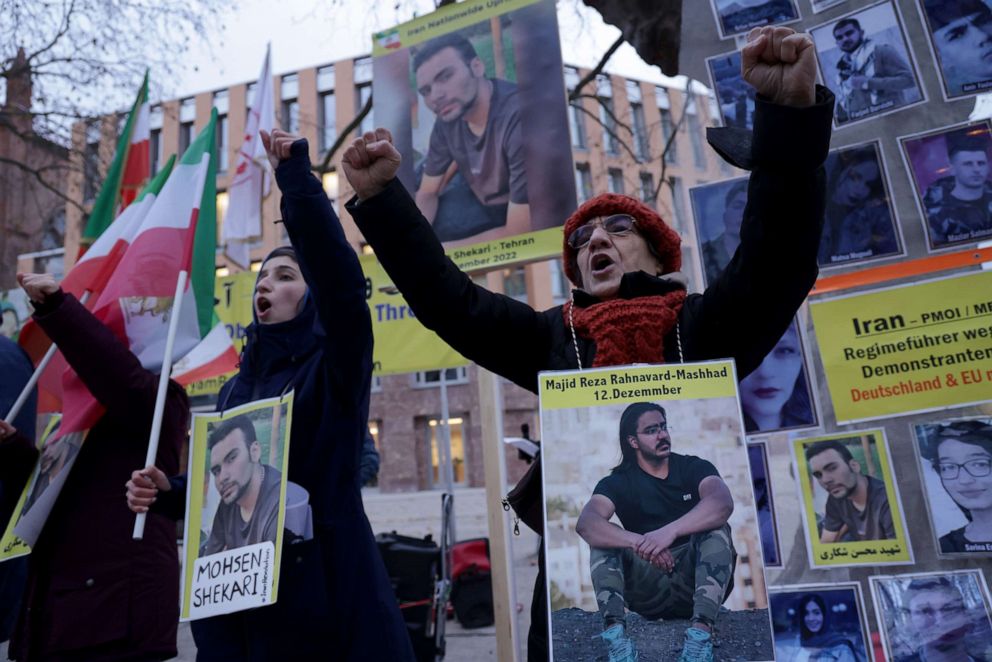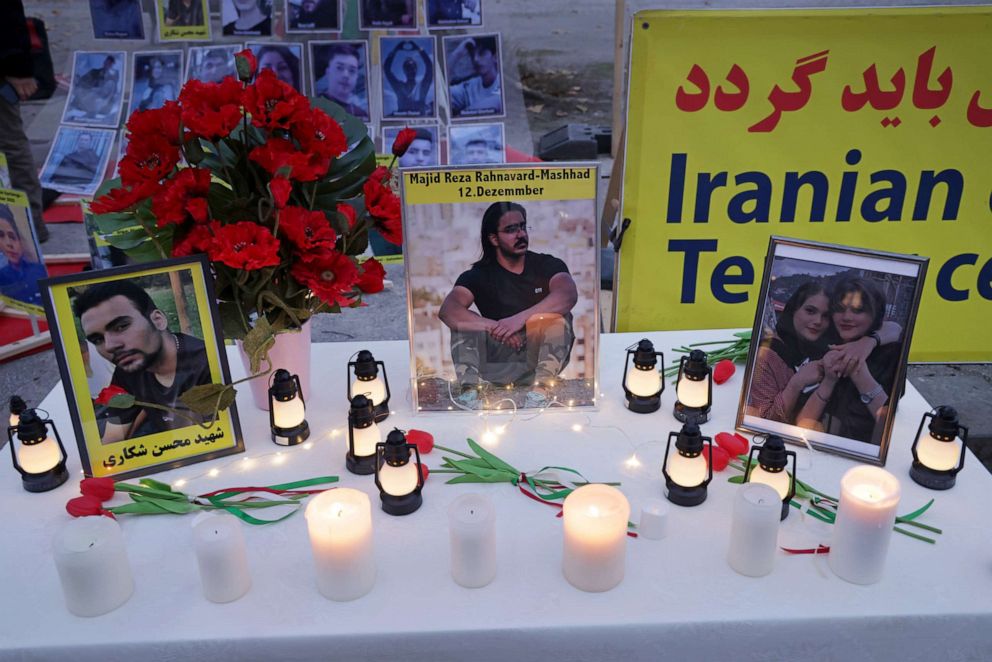LONDON — Iran on Monday executed a second man, 22-year-old Majid Reza Rahnavard, who had been convicted on charges of “waging war against God” amid ongoing protests in the country.
Rahnavard, who was accused of killing two guards and creating an atmosphere of fear, was hung in his hometown of Mashhad, according to Iran’s Mizan news agency, which serves as the media center of the country’s judiciary. His family told activist groups they only found out by a phone call from security forces and got an address of where their son was buried.

Portraits of Majid Reza Rahnavard, 23, and Mohsen Shekari, 23, both of whom were recently executed by Iranian authorities, and Mahsa Amini stand on a table among candles during a demonstration by supporters of the National Council of Resistance of Iran outside the German Foreign Ministry, Dec. 12, 2022 in Berlin.
Sean Gallup/Getty Images
Rahnavard is the second protestor executed by the Islamic Republic in less than a week on charges related to the ongoing protests that have gripped the country in recent months. On Thursday, Mohsen Shekari was executed for closing a street in Tehran and injuring a policeman with a knife.
Neither Rahnavard nor Shekari was allowed to appoint their own lawyers. Their execution sentences were carried out 23 and 73 days, respectively, after their arrests, a “surprisingly quick” trial for such cases even with the Islamic Republic’s norms, lawyers said.
A lawyer in Iran, who could not be identified due to security concerns, previously told ABC News the judicial process behind Shekari’s trial and execution “was not transparent and not normal at all.”
“Crimes that are punishable by death, such as ‘moharebeh,’ must have a lawyer in the case,” the lawyer said. “But Shekari was denied the right to appoint a lawyer.”
Crimes such as “moharebeh” are “open for interpretation” by judges, the Iranian lawyer told ABC News on Monday. “Any action, be it setting a bin on fire or closing a street, can be decided to be a sample of waging war against God. Not being able to appoint a lawyer in such a court makes it a total sham trial.”
According to the judiciary reports over the past few weeks, at least 20 more people are currently either on death row or charged with “waging war against God” and “corruption on Earth” for participating in the protests, which — according to Iran’s Sharia law — are punishable by execution.
“These prisoners and their families are facing tough days,” an Iranian activist, who did not want their name to be mentioned for security concerns, told ABC News. “They see these executions and can’t keep up hope for having a fair trial for their dear ones.”

Protesters wear portraits of Majid Reza Rahnavard, 23, and Mohsen Shekari, 23, both of whom were recently executed by Iranian authorities, during a demonstration by supporters of the National Council of Resistance of Iran outside the German Foreign Ministry, Dec. 12, 2022 in Berlin.
Sean Gallup/Getty Images
“Every night I worry that they will bring me the news of my child’s execution,” Mashallah Karami, father of Mohammad Mehdi Karami, another protestor sentenced to execution, told Iran’s Etemad Daily on Monday. His son was arrested after participating in the funeral of one of the victims of the protests in Karaj, a town north of Tehran, on Nov. 3.
Karami’s father told the Etemad Daily that his son, too, is not allowed to appoint his own lawyer, and instead, a public defender is assigned by the court to represent him.
The public defender, however, does not respond to his phone calls, Mashallah Karami said. “The lawyer even refused to give me the address of his office,” Karami’s father told the newspaper, leaving the family in confusion about how to even appeal the court decision.
The Islamic Republic judiciary news website, Mizan, claimed that Rahnavard was executed in “public,” but many people on social media said the crowd shown in pictures of the execution consisted of guards and Basij militias, not ordinary people supporting the execution.
“This is another propaganda by the regime trying to buy itself credit by committing a murder and then staging fake spectators to the scene,” a journalist, who could not be identified due to security concerns, told ABC News. “How could anyone from the public be there to watch the execution when it was totally unannounced, that even Rahnavard’s own family did not know?”
Since the protest movement erupted in September, sparked by the death of 22-year-old Mahsa Amini in police custody following her arrest for breaching Iran’s strict dress code for women, the Iranian authorities have killed at least 458 including 63 children, according to the NGO Iran Human Rights, with at least 15,000 detained.



